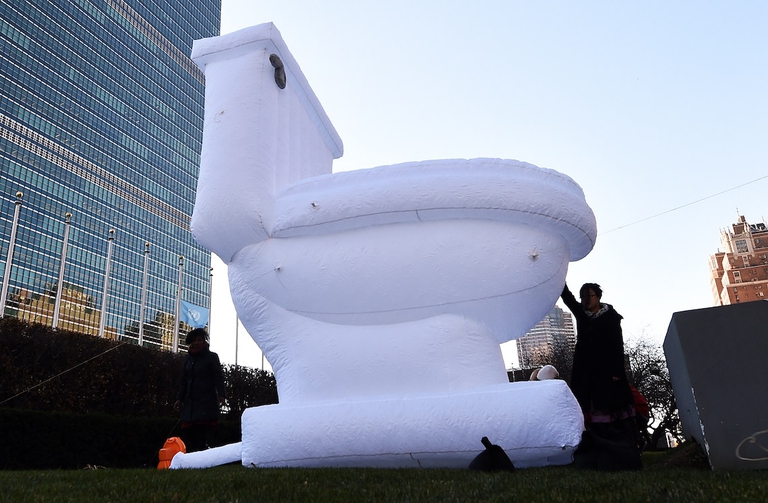
Costa Rica celebrated its first same-sex marriage when two women, Alexandra Quiros and Dunia Araya, celebrated their wedding: an “extraordinary moment”.
The 19th of November is World Toilet Day (WTD), an international day aimed at raising awareness and mobilising individuals around the world on issues of sanitation. Established in 2001 by the World Toilet Organisation, the campaign has since gained increasing global recognition. In 2013 the United Nations passed a resolution (UN Resolution A/67/L.75), marking it
The 19th of November is World Toilet Day (WTD), an international day aimed at raising awareness and mobilising individuals around the world on issues of sanitation. Established in 2001 by the World Toilet Organisation, the campaign has since gained increasing global recognition. In 2013 the United Nations passed a resolution (UN Resolution A/67/L.75), marking it as an official international day, with a permanent place in the calendar of such events.
Sanitation is a global sustainability problem. It is estimated that around the world there are 2.3 billion people living without basic sanitation facilities. Water scarcity, poor water quality and inadequate hygiene and sanitation practices negatively affect people’s health, livelihoods and opportunities for education. Each day, about 800 children die due to preventable water and sanitation-related diseases such as diarrhoea.
To overcome this global issue, the UN has established a target dedicated to sanitation in the form of Sustainable Development Goal 6 (ensure access to water and sanitation for all): that everyone has access to toilets by 2030.
Why talk toilets?
It’s simple. Because when 1 in 3 people around the world STILL live without access to the human right of sanitation, diseases spread fast, children die and entire countries are locked in poverty.
Ahead of #WorldToiletDay next week, please RETWEET this video. pic.twitter.com/A4NknB8BQT
— WaterAid UK (@WaterAidUK) November 12, 2018
Having to defecate in the open is an infringement of human rights. Whilst this widespread practice negatively affects the lives of men and women alike, the latter face more risk of being shamed because of it. Lack of adequate toilet facilities and privacy often means that women can’t manage menstruation and pregnancy in private, or that to do so they wait until dark, which increases their vulnerability to being attacked.
Each year WTD focuses on a theme, and this year it is drawing attention to those people being left behind without sanitation. A toilet is not just a toilet. It’s a life-saver, dignity-protector and opportunity-maker. However, even if sanitation is a human right, 4.2 billion people still live without safely managed toilets. That’s why a world effort is needed to expand access to toilets and to leave no one behind.
Last year’s theme was toilets and nature. It focused on developing sanitation systems that are in harmony with our environment, harnessing the power of ecosystems. This included the use of composting latrines, which provide free supply of fertiliser, and reed beds sewage systems to filter liquid waste before it is released back into water courses.
Bill Gates talks toilets
Take a quick look at some of the @gatesfoundation inventions that are transforming lives: https://t.co/rj6Qt7RyE6 #WorldToiletDay pic.twitter.com/IPRlpD6bsW
— UN-Water (@UN_Water) November 11, 2018
Each year there are hundreds of events all over the world aimed at increasing knowledge and raising awareness on the problem of hygiene and sanitation. You can learn more about this issue and get involved by spreading the knowledge, organising or taking part in an event near you and helping in raising funds to overcome this global challenge.
Siamo anche su WhatsApp. Segui il canale ufficiale LifeGate per restare aggiornata, aggiornato sulle ultime notizie e sulle nostre attività.
![]()
Quest'opera è distribuita con Licenza Creative Commons Attribuzione - Non commerciale - Non opere derivate 4.0 Internazionale.
Costa Rica celebrated its first same-sex marriage when two women, Alexandra Quiros and Dunia Araya, celebrated their wedding: an “extraordinary moment”.
On top of a 2.4 million dollar compensation, the indigenous Ashaninka people will receive an official apology from the companies who deforested their lands in the 1980s.
From Italy to the United States, workers in the logistics and delivery sectors are protesting to demand better sanitary conditions to protect themselves from Covid-19.
The pandemic and its restrictions are affecting everyone, without exceptions. However factors like housing, income inequalities, gender, access to technology and working conditions are influencing how people experience the health crisis.
In the midst of India’s coronavirus lockdown, two dozen people lost their lives in a desperate bid to return home: migrant labourers forced to leave the cities where they worked once starvation began knocking at their doors.
Apple, Dell, Microsoft and Tesla are among the tech companies named in a lawsuit brought in the US by the families of children killed and maimed in cobalt mining activities in the Democratic Republic of Congo.
We, the people is Survival’s 2020 calendar, which features the winners of the photography contest showcasing images of the world’s indigenous peoples.
Un violador en tu camino – the rapist is you – is an anthem protesting the impunity of gender-based violence. It began in Chile and has become a global flash mob, bringing people to the streets and resonating all over the world.
Abiy Ahmed was awarded the Nobel Peace Prize for reaching peace with Eritrea. Yet, Indigenous groups in Ethiopia’s Lower Omo Valley have been abused by security forces, a fact that the prime minister must address, says the Oakland Institute.








